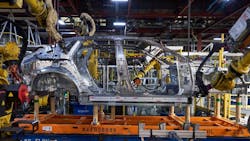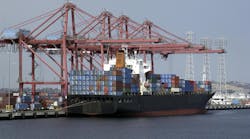Big Automotive Names Tap The Brakes on Major Tariff-Related Decisions
Score one for the nimbler modern multinational automotive manufacturer?
In recent weeks and through several channels, the idea has surfaced that, for several big auto companies, tariffs in the second Trump administration might turn into something more along the lines of “Don’t just do something; stand there!” than an all-hands supply-chain and production overhaul. CEOs and CFOs, including from General Motors Corp. and Daimler Truck Holding AG, have said they are confident in the flexibility of their production networks and are stepping carefully in facing the prospect of new trade barriers with Mexico and/or Canada that might be put into place by President-Elect Donald Trump.
“The key in situations like this is just not overreact,” GM CFO Paul Jacobson told attendees of the UBS Global Industrials & Transportation Conference early this month. “Because—as we’ve seen the industry do in the heavy pivot to EVs and then back and then dip your toe in the water—that just burns a lot of capital and it creates inefficiencies. So it’s better to be a little bit patient. And if that means we have to incur some costs in the short run, that might be the better long-term solution.”
In the same vein, Jacobson’s counterpart at Stellantis NV said the parent of Jeep and Dodge is prepared to resort to tweaks rather than wholesale changes.
How are you navigating today's uncertainties around tariffs and trade policy?
Endeavor Business Intelligence invites you to take part in the Strategic Tariff Impact Survey for B2B Vertical Market Leaders. This short, four-question questionnaire explores organizational preparedness, supply chain resilience and financial impact projections and your responses will contribute to a comprehensive understanding of the strategies that are driving resilience in the face of potential tariff shifts.
“There’s opportunities to shift some of the mix more into the plants,” CFO Doug Ostermann said at the Goldman Sachs 16th Annual Industrials & Autos Week. “We’ve already industrialized the product in both [Michigan and Mexico] so we would have an opportunity to just shift some of the mix and de-bottleneck things like that to try and help the capacity.”
Ostermann’s comments struck a tone similar to that of Daimler Truck Holding AG Chairwoman and CEO Karin Rådström in the immediate wake of last month’s election. Rådström told analysts Daimler Truck North America, which makes Freightliner and Western Star trucks as well as Thomas Built Buses, isn’t reliant on its Mexican operations to produce any specific models and can switch between making various models at any of its plants.
Weighing Short Term vs. Long Term
These executives’ relatively calm views of how they’ll adapt to possible tariffs reflect the greater operational flexibility they’ve invested in over the years. Many manufacturers are increasingly leaning on an “in the market, for the market” regional approach to many of their products that is less pervious to changing trade winds than the more centralized models of past decades.
To be fair, GM, Stellantis and Daimler also have the “benefit” of being able to flex production more than usual because demand for their products has tailed off from its post-pandemic pace. That gives them some operational breathing room, most notably at Stellantis. At the Goldman Sachs gathering, Ostermann pointed to executives having the option to move capacity to their plant in Belvidere, Illinois, which they idled last year.
But companies’ preference for incremental reactions to possible tariffs also stems from the fact that the picture remains quite fuzzy. Among economists and policy watchers, there’s little consensus as to whether Trump will follow through on his tariff threats—you may have noticed a marked increase since early November in the use of the word “cudgel”—and that makes it more difficult for companies to justify big moves. They’re somewhat caught betwixt and between.
“We don’t want to make a bet on a short-term tariff environment that turns into a long-term [one],” Jacobson said during his UBS appearance. “But likewise, we don’t want to set off the business on long-term decisions that don’t we actually make.”
The most recent Purchasing Managers Index report from S&P Global Market Intelligence suggests many manufacturers aren’t spending as much time peering into the future. Those leadership teams have decided that discretion—or, in this case, action—is the better part of valor: S&P Global Chief Business Economist Chris Williamson said his team has seen prices for raw materials “spike sharply higher amid supplier-led price rises and higher shipping costs, in a reflection of busier supply chains in advance of threatened protectionism in the new year.”
About the Author
Geert De Lombaerde
Senior Editor
A native of Belgium, Geert De Lombaerde has been in business journalism since the mid-1990s and writes about public companies, markets and economic trends for Endeavor Business Media publications, focusing on IndustryWeek, FleetOwner, Oil & Gas Journal, T&D World and Healthcare Innovation. He also curates the twice-monthly Market Moves Strategy newsletter that showcases Endeavor stories on strategy, leadership and investment and contributes to other Market Moves newsletters.
With a degree in journalism from the University of Missouri, he began his reporting career at the Business Courier in Cincinnati in 1997, initially covering retail and the courts before shifting to banking, insurance and investing. He later was managing editor and editor of the Nashville Business Journal before being named editor of the Nashville Post in early 2008. He led a team that helped grow the Post's online traffic more than fivefold before joining Endeavor in September 2021.



